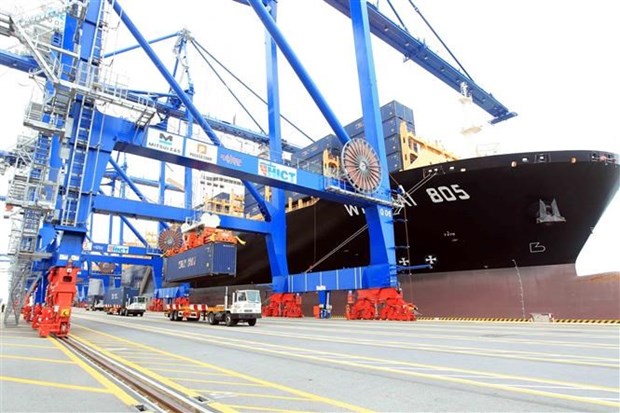The Vietnam Maritime Administration (VMA) plans to set up a working group to inspect the hike in freight rates among shipping companies that have routes to Europe and America.

The Vietnam Maritime Administration (VMA) plans to set up a working group to inspect the hike in freight rates among shipping companies that have routes to Europe and America.
In a recent interview with Vietnam News Agency, deputy head of the VMA Hoang Hong Giang said the move aimed to remove difficulties for export activities and ensure transparency in the listing of freight prices.
Giang attributed the price hike to the strict border controls and limited trade activities during the prolonged COVID-19 pandemic.
“Many seaports, especially in Europe and America, are in a state of stagnation due to a lack of manpower. This results in millions of congested containers at ports or borders, causing a shortage of empty containers for packing,” Giang said.
“Some seaports applying isolation measures also leads to longer ship turnaround times than before.”
Another reason was the increase in import demand of America and Europe for goods from China and Asia, Giang said.
The increased demand led to an imbalance between the volume of goods exported and imported from October 2020. In 2020, the volume of export containers increased, up 13 per cent over the same period last year, reaching 7.38 million twenty-foot equivalent units (TEUs), while the volume of imported goods increased 8 per cent, reaching 7.27 million TEUS.
During the last three months, freight rates had soared to US$8,000, even to $10,000 in certain cases, from less than $1,000 at the beginning of 2020. It has sharply driven up expenses for exporters and raised concerns over a lack of transparency and inadequate price management of containers, he said.
Besides rising freight rates, many businesses couldn’t occupy room on ships due to the lack of empty containers, goods ready for export thus couldn’t be transported, leading to rising inventories, he said.
As many as 90 per cent of Vietnamese enterprises inked import contracts with the CIF (cost, insurance and freight) condition, and export contracts with the FOB (free on board) condition. Under these contracts, foreign partners were mainly responsible for shipping phases. However, due to the increased rates, the foreign partners required Vietnamese enterprises to share the added cost, he said.
"The continuous increase in freight rates and surcharges has caused many difficulties for businesses, increasing transportation and storage costs, affecting production and distribution of goods.
“It is now the peak season for exported goods such as agricultural and aquatic products, but goods are not delivered on time. Therefore, the contracts were cancelled by foreign partners. The materials imported to Viet Nam to serve production were also delivered late, causing the production lines to be interrupted. If this situation continues, some businesses will even have to shut down production,” Giang said.
In order to remove difficulties for shipping, VMA had directed the port authorities to co-ordinate with State management agencies at seaports to speed up the procedures for ships entering and leaving ports, facilitating large-tonnage ships to enter and exit, requiring seaport enterprises to increase their operational efficiency, make the most of their resources to release ships quickly and prevent delays in the cargo handling process.
Regarding the listing of prices, VMA had issued a document requiring shipping companies to strictly list their charge rates publicly and transparently, increasing prices in accordance with the provisions of law.
So far, shipping lines had not strictly followed the regulations, Giang added.
VMA had proposed the Ministry of Transport to co-ordinate with the Ministry of Industry and Trade and the Ministry of Finance to set up a working group to inspect the increase in freight rates and surcharges of shipping lines that have routes to Europe and America.
It also sent a petition to the Ministry of Transport, urging it to consult the Ministry of Finance to direct the customs forces at ports to speed up the clearance of backlogged containers so that enterprises have empty containers for transportation.
According to a report by the VMA, the volume of container cargo through the local seaports in 2020 reached 14.65 million TEUs, up 10.6 per cent compared to 2019, in which the export container volume was 7.38 million TEUs, up 13 per cent year-on-year, imported ones were 7.27 million TEUs, up 8 per cent compared to 2019.
Despite the impact of the COVID-19 pandemic, the volume of goods exported and imported overseas still saw stable growth. However, in the last months of 2020, import-export businesses faced many difficulties due to rising sea freight rates and a lack of empty containers.
Regarding the volume of empty containers, as of mid-January this year, the total number of empty containers stored at seaports reached 40,946, of which 40-feet containers account for 70 per cent. Such an amount was just enough to meet the average export volume over 3 to 4 days, Giang said. — VNS





